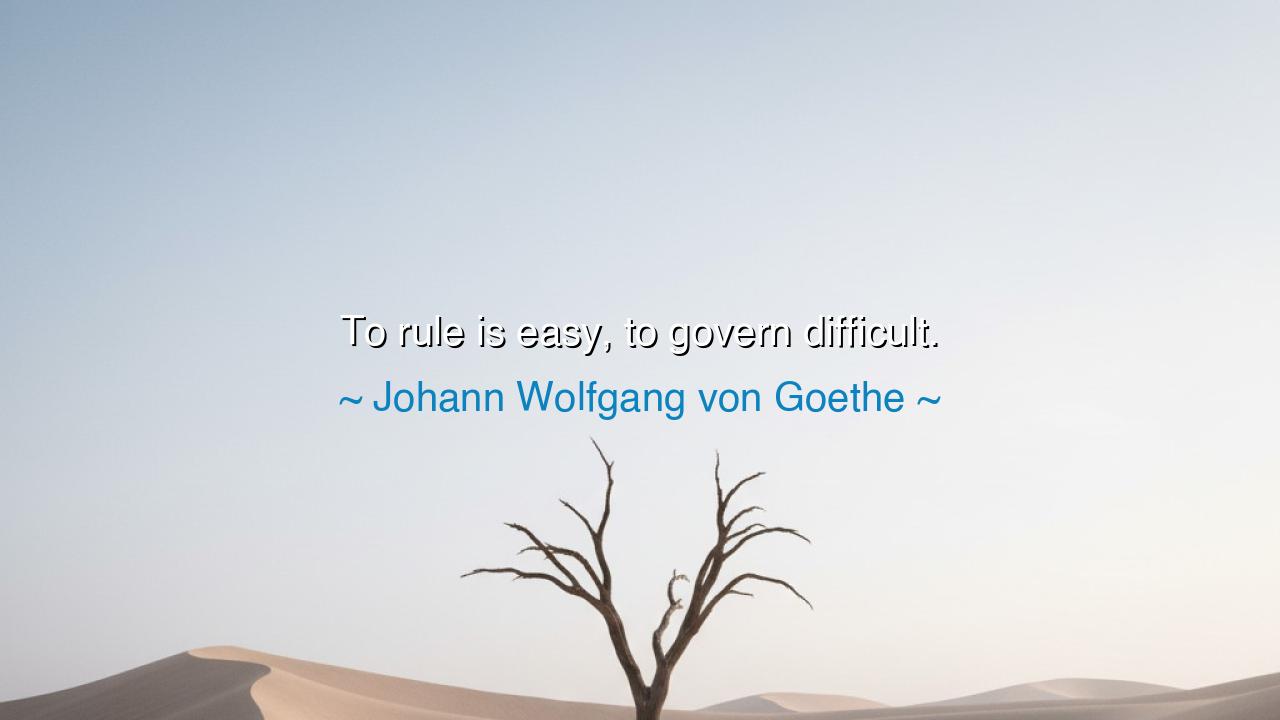
To rule is easy, to govern difficult.






“To rule is easy, to govern difficult.” — Johann Wolfgang von Goethe
Listen, O seeker of wisdom, for within these words lies the heartbeat of all human leadership. When Johann Wolfgang von Goethe, the sage of Germany, uttered this truth, he spoke not only of kings and statesmen but of the eternal struggle between power and responsibility. To rule is to command — to sit upon the throne and issue decrees. But to govern is to guide the hearts of men, to bring order from chaos, justice from ambition, harmony from conflict. One is the vanity of dominion; the other, the labor of the soul.
In every age, the world has known those who sought the crown, yet few who bore its weight with honor. To rule, indeed, is easy — for any man with soldiers or wealth may seize control. A tyrant can rule by fear, a demagogue by flattery, a fool by inheritance. But to govern, to nurture a people as a gardener tends his orchard — that is a sacred art. It demands patience, wisdom, and the humility to listen. The ruler commands; the governor serves. And therein lies the gulf between the two.
Consider the tale of Marcus Aurelius, the philosopher-emperor of Rome. He inherited not only an empire but a burden: the task of ruling men whose hearts were torn between decadence and duty. Many before him had ruled Rome — Nero, Caligula, Commodus — and their reigns were drenched in blood and ruin. But Marcus sought to govern, to guide his empire through justice and reason. In the quiet of his tent, amid the noise of war, he wrote the Meditations, reminding himself that power without virtue is corruption, and command without compassion is tyranny. His greatness lay not in his rule, but in his governance — not in conquest, but in conscience.
Goethe, wise in the ways of men, saw that true governance is the hardest of all labors because it deals not with objects, but with souls. To govern, one must balance law with mercy, structure with freedom, the needs of the many with the dignity of each. It is a craft of listening and discernment, of knowing when to act and when to yield. The ruler asks, “How do I keep control?” The governor asks, “How do I serve well?” The first feeds his power; the second feeds his people.
Look to the modern world and see how this lesson remains unchanged. Leaders abound, yet few are true governors. Many crave the throne but shun the burden of wisdom. They promise prosperity yet sow division, wield authority yet lack understanding. They have learned how to rule, but not how to govern. And so, as in Goethe’s time, nations rise and fall not by war or famine, but by the quiet erosion of virtue in those who lead.
The wise will see that this truth extends beyond politics. Every parent, every teacher, every leader of men faces the same choice — to rule or to govern. To rule a household is to demand obedience; to govern it is to inspire love. To rule one’s own passions is to repress them; to govern them is to master them. The heart of governance lies not in domination, but in discipline. It is the art of guiding with wisdom, not wielding with pride.
Therefore, take this lesson, O listener, and carry it into the chambers of your own life. When you find yourself in a place of authority — whether over others or over yourself — remember that ruling is but the shadow of greatness, while governing is its light. Speak not first to command, but to understand. Seek not to bend others to your will, but to awaken the best within them. For only when power is tempered by wisdom does it cease to destroy and begin to heal.
And so, as Goethe teaches across the centuries: to rule is easy, to govern difficult — but it is in the difficult that the divine is revealed. Anyone may wear a crown, but only the wise may make it worthy. Rule if you must; govern if you can — for the world needs not more rulers, but more guardians of the human spirit.






AAdministratorAdministrator
Welcome, honored guests. Please leave a comment, we will respond soon